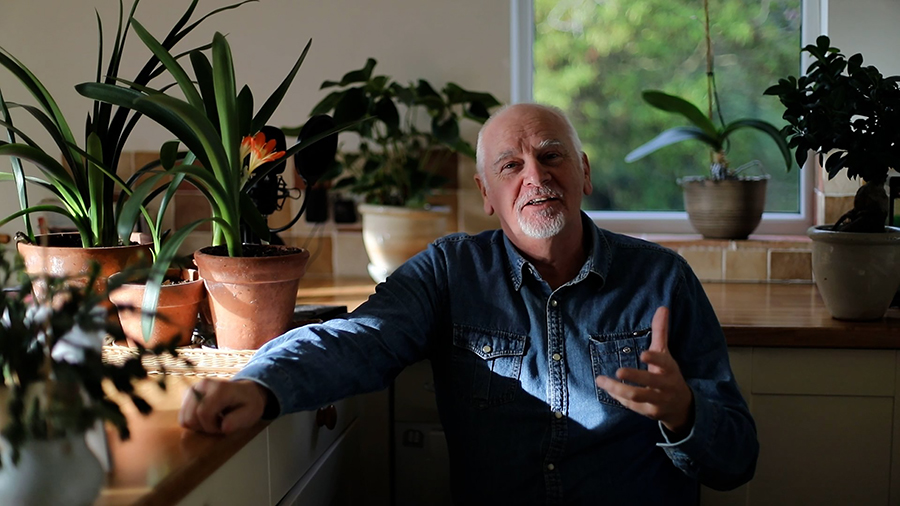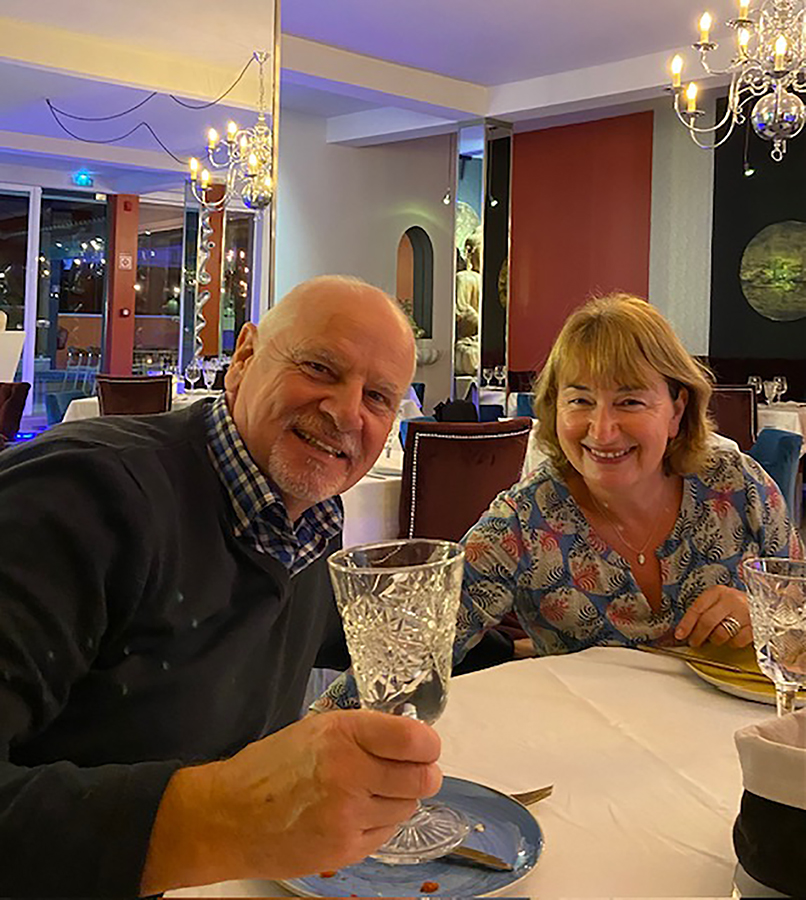Kelvin Burke describes what being held by God means for him
This article was published in the January to April 2025 edition of Rapport magazine.

A few months ago, Simon Guillebaud interviewed me for the Inspired podcast. He asked how I, as a Christian, had reacted to a life-changing accident and eight months in hospital. I instinctively answered, ‘I felt held through it all, I didn’t spiral into depression; every day the Lord provided for my spiritual needs with Scriptures and visits from the chaplain. God was assuring me that he was “with [me] always” ’ (Matt. 28:20).
At twenty-three it had looked like I had it all going for me: an active Christian, sportsman and a good job as an accountant, I owned a four-bedroom detached house and a boy-racer Ford Capri. Then the bottom fell out of my rosy world.
I suffered a spinal injury in a near-fatal car accident on Honister Pass in the Lake District, Cumbria. As I lay waiting for the ambulance, I distinctly heard the Lord saying, ‘I am with you always.’ This verse sustained me like ‘bread of heaven’ as I survived intensive care and many months in a spinal injuries unit in Yorkshire.
“To know we are held is so precious
when we are desperately in need,
seeking guidance
or overcome with grief.”
To know we are held is so precious when we are desperately in need, seeking guidance or overcome with grief. It is not a passive word; it is active assurance from our ever-present helper, being just that (Psalm 46:1). In writing this article I hope this word ‘held’ means as much to you, dear reader, as it does to me.
Returning to my accountancy work wearing full-length calipers, after spending most of my twenty-third year in hospital and rehab, I was no longer the confident sportsman who had set off for the Lake District the previous year. I knew I had been spared, and I resolved to testify of the one whose voice I had heard on that dark day when I was transformed from able-bodied to the ranks of disabled people.
A few years later, I met and married Jennie and felt privileged that the Lord had blessed me with a soulmate and confidante for the journey ahead.
In time, I discerned a calling to hospital chaplaincy and was appointed a full-time healthcare chaplain in Yorkshire, and then the Isle of Wight, serving patients in both the hospital and the hospice.
Pastoral and spiritual care in a healthcare setting is intense. Often people seek meaning and purpose in life post-trauma. Assumed ‘givens’ like independence, mobility and good health are stripped away and life looks different for many, following illness or trauma. Then along comes the chaplain in a wheelchair. And because that young twenty-three-year-old was trapped under a car off Honister Pass – broken and traumatised – he finds immediate rapport. Fruitful encounters develop from there and over the years I have been privileged to see God reach out and touch the lives of many who were open to a spiritual conversation or a silent prayer at their time of need.
That is how our wonderful, merciful, compassionate Lord is, reaching out, longing for us to take his outstretched nail-scarred hand. As Henri Nouwen wrote, he is our wounded healer. He retains the scars from when he was wounded for our iniquities and our healing. Christ, the wounded healer, has immediate rapport and empathy with the broken person, ‘offering not an ideology but himself’ (The Wounded Healer, Henri Nouwen, 1972, Doubleday).
That is my own testimony too. In my time of need, I realised the Lord was active, holding me, grieving and mingling my tears with his. The Holy Spirit, whispering ‘with you always’, was reassuring me of his presence.
I would like to unpack what held means to me. Not just back then, after the accident, but today after several decades of seeking healing and waiting on the Lord. To be held in the Lord’s tender care looks very different as a family man with daughters and granddaughters, from the cocky, sporty twenty-three-year-old who was crushed in a car accident.
Today I praise God with the words that Ada Habershon wrote in 1907: ‘He will hold me fast, for my Saviour loves me so, he will hold me fast.’ It sums up the refuge and strength at times of trouble that I am trying to depict.
Held is personal
To those who suffer physical or mental loss or tragedy – the Lord offers himself. He who is described as ‘a man of sorrows, and acquainted with grief’ (Isa. 53:3 KJV), knows suffering and grief first-hand. We cannot earn this presence, but it is truly given. He is our compassionate, empathetic, ever-present helper. He holds us, as we are, in our delicate condition, in our loss and brokenness, and as we weep, he holds our tears (Ps. 56:8). In our weakness he offers to be our strength; the Lord waits longingly for us to take him up on this offer. Like the door-knocking Christ (Rev. 3:20), he whispers, ‘Invite me in and I will sup with you.’ In this context, sup is far more than a cup of tea: supping is a metaphor for intimacy and presence. This is personal. In giving a perpetual instruction to sup at the Lord’s Supper, our Lord Jesus invites us to engage intimately with him, with Holy Communion being a symbolic memorial. That is why the fellowship of Corpus at Lee Abbey often seems anointed and special. We are one body, just as Christ refers to himself as one bread, which was taken and broken (on the cross) and shared.
Held is peace
In times of joy and crisis he, Jesus, is our peace. This is not cerebral peace that must be conjured by positive thinking in the heat of pain and suffering, sleepless nights, fears and anxiety. This is a personal invitation to ‘come to me’. In Matthew 11:28 we find a rare self-description by our Lord, who says he is ‘meek and lowly in heart’ (KJV), and in the same breath, he offers rest for our soul. We find that rest as he yokes himself up with us. It is another glimpse of being held. The rest and peace that he offers is a supernatural peace that no amount of mindfulness or meditation can give. As Jesus said, it is a peace that the world cannot give
(John 14:27).

Held is loved
To be divinely held is not a God-given resilience but a loving embrace, an indwelling love, a strengthening love: the unsurpassable love of Jesus. Emmanuel means ‘God with us’ and he will never leave us nor forsake us. In the height and heat of suffering, choose to believe and trust in his unfailing love. The circumstances may scream otherwise: ‘He is not with you, he can’t love you, he has abandoned you.’ Reply to that voice of the tempter by saying, ‘Though he slays me yet I will trust in him’ (Job 13:15 KJV). Even in the crisis, choose to hold fast to this truth that he holds fast to you (Ps. 139:10), that he is merciful, that he is ever-present and unconditionally loving.
Held in waiting
“In the crisis, choose to hold fast to this truth that he holds fast to you … that he is merciful, that he is ever-present and unconditionally loving.”
Perhaps, like mine, your journey is long and drawn out with many highs and lows. You may manage to leave a retreat on a high: renewed, refreshed and resourced to endure the low that may be ahead. After more than forty years of paralysis and being held and loved by the Lord, I don’t wish to sound like a super-spiritual eejit. To counter this my wife, Jennie, offers these words that fit well with being held in waiting.

‘I met Kelvin when I was a student; he had been a paraplegic for five years. I had not met anyone who was disabled by a spinal injury. From the beginning, a shared love of Jesus was crucial to us. Times of reading the Bible and praying and praising together was our lifeline. We have been married for thirty-eight years. People often ask how we manage in times of illness, pain, physical difficulty and complications of paraplegia and I can honestly say it is due to a daily walk with Jesus, believing he carries us through. When we are tempted to have a ‘pity-party’ or be downhearted we often find encouragement in the Word and by challenging each other to trust in God, our refuge and strength – he is our ever-present help in trouble.’
Post-accident and forty-plus years of waiting, I can lament with the psalmist, ‘How long, O Lord …’ (Ps.13:1 ESV). This is a very real God-given prayer and a genuine expression of frustration when God seems silent or distant. Daily prayer and reading of the Word are still vital sustenance and nourishment for my every day with Jesus. I do confess that self-pity and self-absorption are ongoing temptations that can rob me of the peace and personal supping with the Lord that I have described. When we have long-term illness, disability and hardship, it is not good to ‘go it alone’, even with a personal walk with God. It is good to have Christian brothers and sisters who will share the burden. That is why places like Lee Abbey and its Rule of Life are important: where brothers and sisters can have fellowship with the Lee Abbey Community in praise, worship and Word, with opportunities for prayer ministry – not to mention the vista, the hospitality and the cuisine.
Join Kelvin at Lee Abbey Devon
LAKE OF TEARS REVISITED
17–21 MARCH 2025 (MON–FRI)
During the week we will delve deeper into the ‘withness’ of God. The age-old question – ‘Where is God when there is suffering?’ is answered resoundingly by the vision of the Lake of Tears. Eight months in hospital following a paralysing spinal injury and eighteen years as a healthcare chaplain contribute to Kelvin’s narrative of God, our ever-present helper. Through Scripture, reflection and well-told story, this retreat will help you encounter the one who is ‘with you always.’
